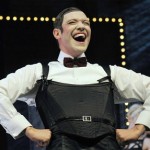The fourth West End revival of the 1966 musical Cabaret has opened at the Savoy to positive if somewhat guarded reviews. This limited-engagement London run, a revised version of the 2006 Olivier-nominated production, is the final stop of a UK tour that began in September at the Mayflower Theatre in Southampton. The creative team includes Joe Masteroff (book), Fred Ebb (lyrics), John Kander (music), Rufus Norris (direction), Katrina Lindsay (design), and Javier De Frutos (choreography). The cast includes Michelle Ryan (Sally Bowles), Will Young (Emcee), Siân Phillips (Fraulein Schneider), Matt Rawle (Cliff), Linal Haft (Herr Schultz), Nicholas Tizzard (Ernst), and Harriet Thorpe (Fraulein Kost) with John Brannoch, Jessica Ellen, Allessia Lugoboni, Edd Mitton, Ian Parsons, Nuno Silva, Rebecca Sutherland, Shahla Tarrant, Laura Tyrer, Cydney Uffindell-Phillips and Matthew Wesley.
Theo Bosanquet (What’s On Stage): It’s a dark, jagged and ultimately harrowing production that brings some welcome shade to a West End overrun with the lightness of “enforced standing ovation” jukebox fare. The restaging also offers the opportunity for Will Young and Michelle Ryan to make their musical theatre debuts. Young excels as the Emcee. … Ryan struggles to lend Bowles the darker edge necessary as the show progresses, but proves an excellent dancer and a more than capable vocalist. … Not everything works. … Nevertheless, the ending remains brutally effective and produces an all-too rarely seen spectacle; an audience filtering out of a West End theatre in contemplative silence.
Lyn Gardner (Guardian): The final 20 minutes of Rufus Norris’s revamped revival of Cabaret are shockingly good. … This is worth the price of a ticket alone, although Norris’s take … always wants to have its cake and eat it. It seeks star casting … and artistic credibility; both divine decadence and political clout. Perhaps not surprisingly, it’s all a little conflicted. … Until Norris shapes up and gets tough in “Tomorrow Belongs to Me,” which has the Emcee as a puppet master manipulating his marionettes, this production operates very cosily at that point where Nazism and eroticism meet. … The evening finally redeems itself. Had Norris dared more from the outset, however, this could have been a rare piece of musical theatre, challenging as well as entertaining.
Charles Spencer (Telegraph): Six years ago the director Rufus Norris directed a West End production of Cabaret. … Now he has revisited that production … but something has been lost, too. Michelle Ryan proves an attractive and unusually wholesome Sally and puts over the big numbers with great assurance. But she never plumbs the emotional depths of the role. … [Will Young] has a genuinely disconcerting stage presence with his slicked-down hair, lustful eyes and predatory stillness, and there is a potent mixture of malignity and glee in his performance…. Norris’s unexpected ending to the show, which it would be a crime to reveal, is even more chilling, and one leaves this patchy but inventive production with a shiver of deep unease.
Paul Taylor (Independent): The show is back in a re-imagined version in which Norris and his choreographer, Javier de Frutos, often find fresh and arresting way of expressing the same conception, with certain key numbers staged completely differently. … At the same time, the production seems to have some lost some of its dangerous edge (the depravity can look a bit strenuously dutiful rather than driven). Young, of Pop Idol fame, sings beautifully and has bags of stage presence in his leather hot pants. … Michelle Ryan, by contrast, signally fails to rise to the occasion of Sally Bowles. … The show is still worth seeing for its bold imaginative sweep and for Sian Phillips’s deeply touching Fraulein Schneider, even if coming to this Cabaret is not quite what it was, old chum.
Ben Walters (Time Out): It’s a strong production, staging tight, slick numbers in a hard, flexible set whose design is laced with hints of German Expressionism. … Young proves a compelling ringleader, his voice expressive, his presence snaring the necessary combination of charm and grotesquerie. … The show’s conspicuous weakness lies in what should be its central relationship, between naïve American newcomer Cliff and iconic demimondeuse Sally. … This leaves a significant gap, admirably filled by Sian Phillips and Linal Haft as landlady Fräulein Schneider and her Jewish suitor Herr Schultz. … As the show builds to its sucker-punch climax, Cliff and Sally come to seem like the silly children Cliff suspects them to be, with Schneider, Schultz and the Kit Kat cast the tragic victims of history.

